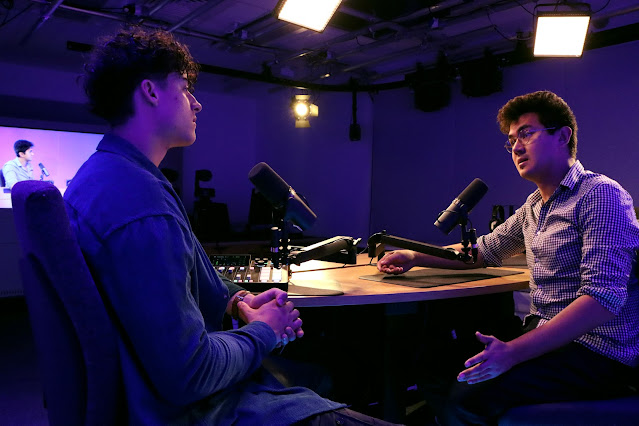By Jack Clayton
Written essays, reports, and dissertations have traditionally served as cornerstones of learning. Honing students' abilities to research, analyse, and articulate complex ideas through the written word. These traditional methods undoubtedly cultivate critical thinking and structured arguments. Yet, in an increasingly digital landscape, are these the only tools students need to flourish?
It is evident that students and audiences in general consume more visual and auditory formats in the modern digital age, including videos and podcasts. We are also seeing a rise in employers demanding digital skills for their job applicants. Increasingly, individuals make money and businesses rely on social media, creating content with a high yield of hits and e-commerce.
Learning to use digital technology and editing are skills that can be used to make a living in the modern age. But what about the level of academic depth presented in media assignments?
In a format such as podcasting, academic points, research and arguments can still be presented thoughtfully and coherently - through voice rather than the written word. The cognition and systems of reference are still there, it's just communicated differently.
Our postgraduate and undergraduate students that conduct podcasting modules experience diversity and creativity in the way they communicate their ideas in the SMI. They have developed crucial communication skills as well as digital communications skills-both of which are essential for a graduating student.
Kitty, Sheffield Methods Institute
Arguably, podcasting also opens up new lines of communication - where students and staff are conducting discussions and interviews. Creators actively develop speaking and presentation skills - considering how to communicate their idea effectively to their chosen audience, and how to extract relevant and useful information out of their interviewee.
Digital Assignments place creative thinking at the forefront, ideally with audience and message in mind. In a video assignment, for instance, what format will communicate their idea more effectively: an interview, voice-over montage or piece to camera? Students have to make choices as to the aesthetic, sound design and editing to make the video more engaging. Making these creative choices determine how the information comes across, the type of information disseminated to the viewer and how the media evokes a sense of emotion or feel.
The use of software when making editing choices familiarises learners with a user interface that contains commands and functions. This is important as there is a huge misconception that students are experts in digital technology because mobile devices are a commonly used medium, this is simply not true. The use of a digital device does not build confidence in creating digital products, the use of software in creative digital assignments does and will help students to cognitively familiarise with a new software UI in industry once they leave the university.
Something generally overlooked in these assignments is planning. Planning is absolutely crucial to the success of any media product. A lack thereof can waste time, money, resources and affect the quality of information presented. It is important to instil the value of planning in our students. Students have to ask questions such as ‘How am I going to get everyone in one place?’ ‘Should task B be completed before task A?’. Essentially this teaches a level of project management skills imperative to the modern workplace and career progression.
It is evident that Creative Media assignments will benefit students as part of a balanced curriculum in preparing them for the modern world, and tick more criteria than just the Digital Capabilities section as part of the Sheffield Graduate Attributes.
If you would like to set up a Creative Media assignment, the university's very own Creative Media Service is here to help. We can provide in-built workshops into your module, with beginner friendly teaching and resources. Our students feel supported as they have a dedicated team on hand for any technical needs - both staff and students can book tutorials with a member of the team throughout the year. Our instructors, resources, equipment and state-of the-art media facilities are here for you.
More info about the standard workshops and resources we provide can be found at this link.
Contact creativemedia@sheffield.ac.uk for more information.
Jack Clayton is a Creative Media Advisor for the Creative Media Service, he teaches staff and students how to create media as well as use media technologies. He researches technologies, lecture and develop teaching resources in the aim of reducing any technological based anxieties.


